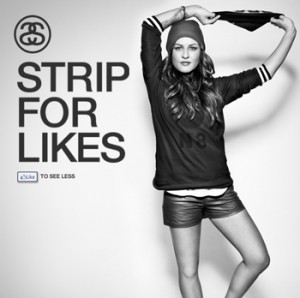By regular contributor Lloyd Gofton who tweets here
 As a social species, we should expect our habits and actions on social networks to reflect our natural priorities as humans… as a species we crave companionship and like to feel part of a community.
As a social species, we should expect our habits and actions on social networks to reflect our natural priorities as humans… as a species we crave companionship and like to feel part of a community.
Our instinct is to learn from each other and share our experiences with like-minded individuals. That habit has served us well, but at some point in our conversations and relationships the number of contacts we have has been given a higher value than the quality of the connection we have with those individuals, groups and brands.
Likes, followers and friends remain the measurement of choice for many of us, even those that know better secretly keep an eye on the amount of people they are interacting with. So although the quality vs. quantity conversation has been going on for many years, something isn’t clicking.
The majority understand the basic concept, it’s better to have 10 meaningful relationships where information is exchanged than 100 empty links. Fine, but try telling a brand that when its closest competitor has two million more likes on Facebook. The digital guys probably get it, the marketing guys may get it, but tell that to the board and they will answer that ‘we need three million more, make it happen’.
There are many factors that contribute to this misconception. The habit of using traditional media measurements on social media, the ROI debate, our natural propensity to believe more = better, the fact that social networks want you to have more friends and more likes because it means you are using the product more and they can sell more advertising.
This is not a new issue, and although slight movement has taken place, real change will not happen until the facts are revealed to everybody. The simple truth is if a brand has seven million likes on Facebook, it does not have seven million opportunities to sell. It’s highly unlikely that the percentage of people actually engaged with that brand even makes it into double figures, or single figures for that matter.
The practise of buying likes/followers/friends is widespread and the impact of this is only now beginning to be understood, after the rush for numbers is over and the engagement begins.
There are different levels of buying likes. For example if you advertise on Facebook using certain terms, you will get more likes even if they are not that useful. Rory Cellan-Jones did an experiment on Facebook earlier this month that had some interesting results.
Fundamentally if your strategy is to build your number of likes, you will attract the wrong people as this is not the behaviour you want in return. If you want people to engage with, and ultimately sell to, more likes will not help.
Here are a few stats that I picked up from Jeremy Waite TBG Digital at the recent Facebook Marketing event….
– 66% of people follow less than five brands. If you’re an accountant, that’s the battle you need to fight
– 45% of people who follow a brand on Facebook never go back
– 98% of people who Like a brand only visit the page once
Jeremy also mentioned that only around 16% of people will see any of your posts on a Facebook page. We’re acquiring a lot of fans that we aren’t reaching. This means mass engagement probably isn’t even a reality, and that is one of the major issues, understanding the difference between an empty like and a real connection.
So perhaps we need to recognise this fact and move the assumption from ‘we have x million fans – well done us’ to ‘we have x million fans of which only x are engaged’. It seems obvious and many brands do this, but many more do not.
The assertion that social and digital is completely measureable, although true, has pushed us towards a false idol. Of course numbers are important, but if we forget that we are dealing with social beings, with conversations, with listening and understanding, then we are not being very social at all.
Just because we can measure something, does not mean we should. Just because we have the data does not mean it is useful. We need to take a step back from the data – move away from the numbers, people!
As a brand, you may only have a relatively small number of fans/likes, but if the percentage of engaged users is higher because you have built this number based on real engagement, you are ultimately more successful than a brand with a huge number of likes and no engagement.
The bottom line is, if you are under the assumption that people use social media to engage with brands, you had better wake up, and realise this is not the case for the vast majority. If a brand is interesting or relevant to a specific conversation or community so be it, but this will not happen through competitions and requests to ‘Like us’ alone.
Perhaps we should ask Facebook to add an engaged count next to the like count – that would be a useful number for everyone to understand.
